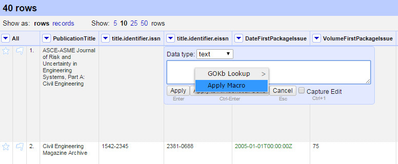We have created macros for existing GOKb data providers and other common transformations.
To run a macro in an OpenRefine project:
- In any cell, click Edit
- Right-click in the box and select Apply Macro
- In the search box, type the name of your provider to locate the correct macro
- Click Ok to run the macro.
- Note: the macro will run automatically and should only take a few seconds. When the macro functions are complete, you should see fewer Error and Warning messages in the left-hand column.
| Transformation | Notes |
|---|---|
| Rename KBART columns to GOKb columns | This code renames all columns in a KBART file to GOKb equivalents except
|
| Trim title.identifier.issn and title.identifier.eissn fields and ensure all 'x' characters are in uppercase | The columns title.identifier.issn and title.identifier.eissn must exist before this code is used |
| Transform volume, number, and date information originally formatted like "1:1 (1919)." | This code creates three columns: DateFirstPackageIssue, VolumeFirstPackageIssue, and NumberFirstPackageIssue. The code assumes you have all of this information in a single column named "PDF Starts." |
| Elsevier Macro: Collapse duplicate titles into single rows | Before applying this macro, confirm:
|
| Provider Transformation Macros | Each provider has one or more transformation macros based on the specific needs of its packages. These can be found on the provider management pages. |
